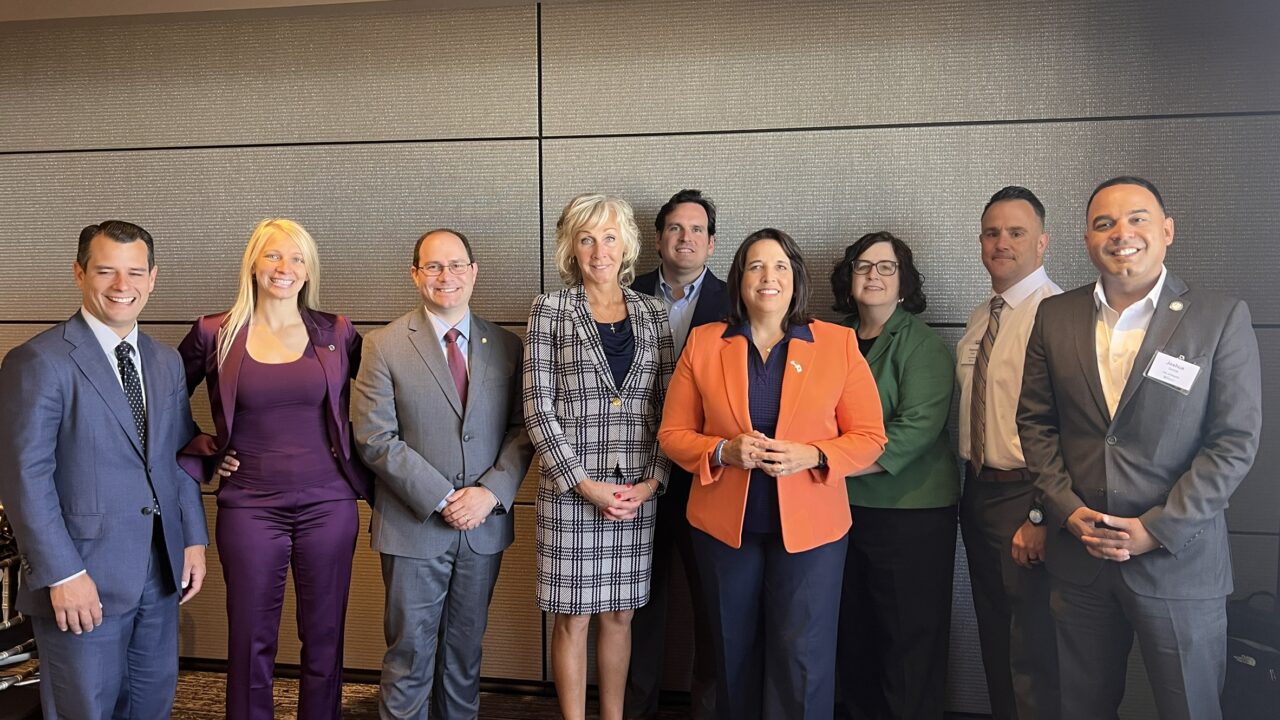On July 22, 2025, municipal leaders, policymakers, and economic development practitioners came together for the 2025 Gateway Cities Leadership Summit, hosted by the Gateway Cities Innovation Institute. Held during a pivotal moment for Massachusetts, when federal uncertainty looms and local needs are mounting, the day was rooted in a simple idea: Gateway Cities are ready to meet the moment.
Welcome: Momentum in the Making
We welcomed attendees by grounding the day in what’s real: Gateway Cities are where the rubber meets the road on every major issue facing the Commonwealth—from housing and transit to education, clean energy, and economic mobility. The message was clear: These regional hubs have the bones, the brains, and the bold leadership. What they need now is coordination, investment, and a system that clears the runway rather than setting up hurdles.
As part of our continued commitment to elevating Gateway City voices, we also announced the hiring of CommonWealth Beacon’s new Gateway Cities Reporter, Hallie Claflin. This new role represents a strategic investment in storytelling and accountability journalism ensuring that the issues, innovations, and lived experiences of these communities are front and center in statewide conversations.
Five Big Ideas for Economic Development
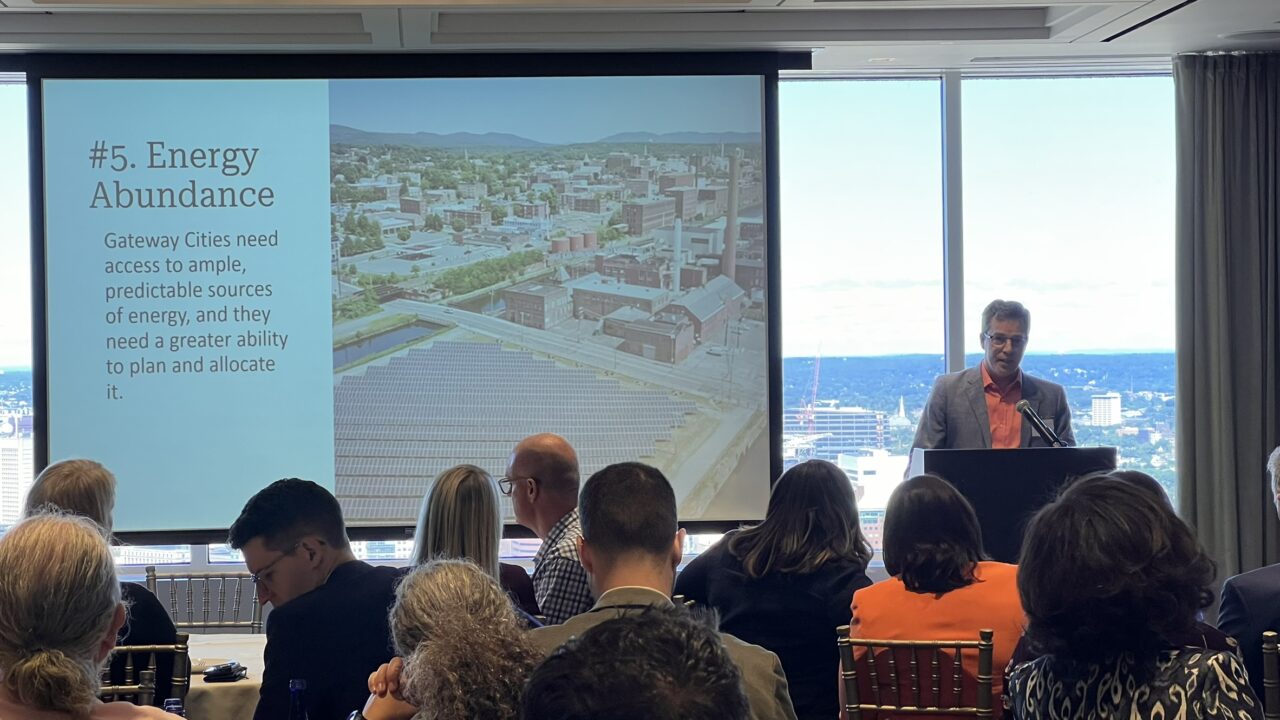
To help frame the day, Gateway Cities Innovation Institute Director André Leroux laid out five big ideas that could help catalyze progress across communities:
- Triple the Housing Development Incentive Program (HDIP) to fuel more middle-income housing development.
- Take the success of MassDevelopment’s TDI program and scale it—especially for climate tech and small business growth.
- Put money into Main Streets and downtowns, not just planning, but storefront activation, marketing, and real investment.
- Pass the Mass Ready Act to make it easier to build in Gateway Cities than in greenfield suburbs.
- Create regional innovation campuses that prioritize energy abundance and affordability as key site selection drivers.
The ideas presented were a challenge to dream big and act urgently—and an invitation to flip the script on who gets to be at the center of Massachusetts’ next economy.
Want to dive deeper into the Five Big Ideas shared at the Gateway Cities Leadership Summit? Check out the latest edition of the Gateway Cities Journal and review the two-pager a concise summary of the recommendations.
Remarks from Lt. Governor Kim Driscoll
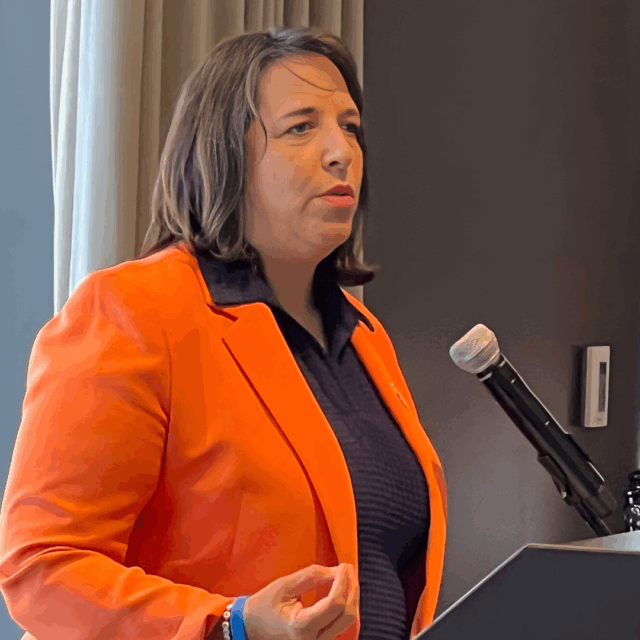
Lieutenant Governor Kim Driscoll took the stage with a tone that was equal parts realist and partner-in-chief. She acknowledged what Gateway City leaders already know: these communities are essential economic engines that are too often overlooked in statewide strategies.
Driscoll shared some of the administration’s early wins and work in progress, including:
- Growing momentum around AI hubs and tech-forward local government,
- Sustaining the Commonwealth’s edge in life sciences and defense manufacturing, and
- Strengthening early literacy with evidence-based reading programs and high-dosage tutoring.
She lifted up transportation as both a challenge and an opportunity. With rising climate threats and aging infrastructure, she sees the MBTA and regional transit authorities (RTAs) as areas where the state can get creative—testing out “Uber-like” innovations and ensuring transit is convenient, not just affordable.
Housing, of course, was front and center. “Density is your friend,” she said to local leaders, calling on Gateway Cities to continue leveraging 3A zoning to build near transit and revive downtown cores.
And in a time when DEI is under attack in other corners of the country, Driscoll was direct: Gateway Cities embody the strength of a diverse Commonwealth, and the administration intends to stand firm.
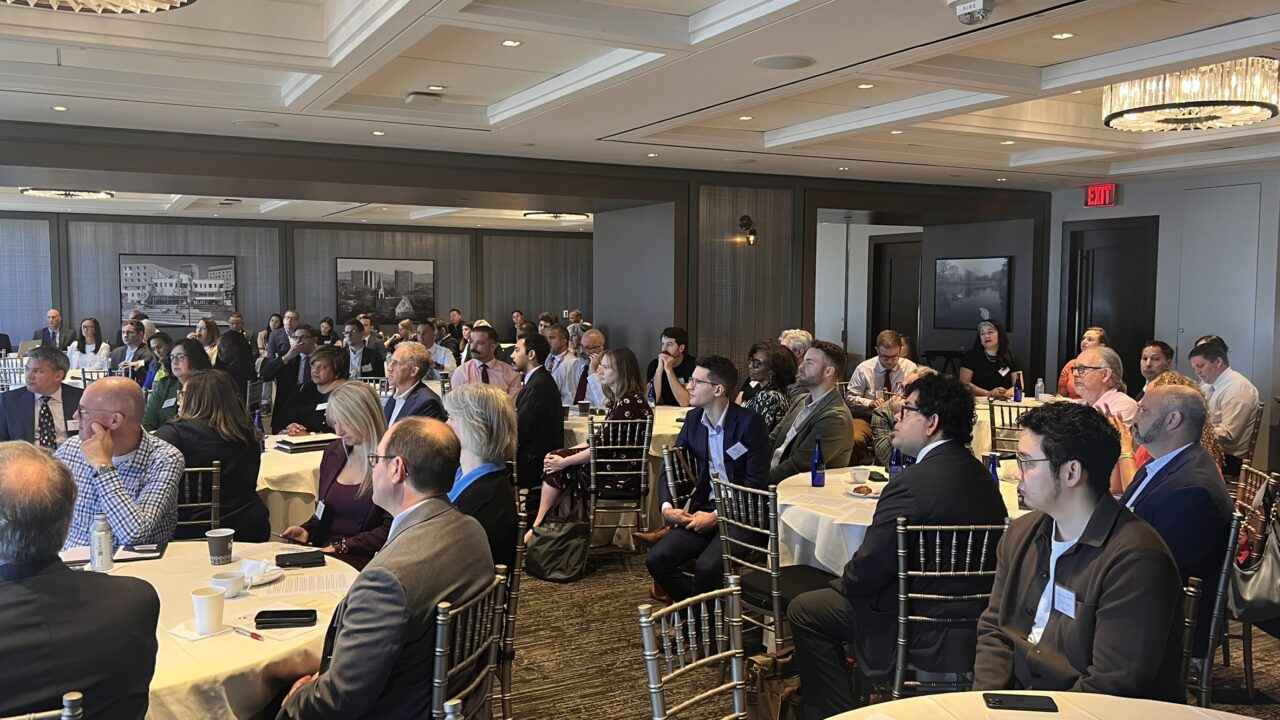
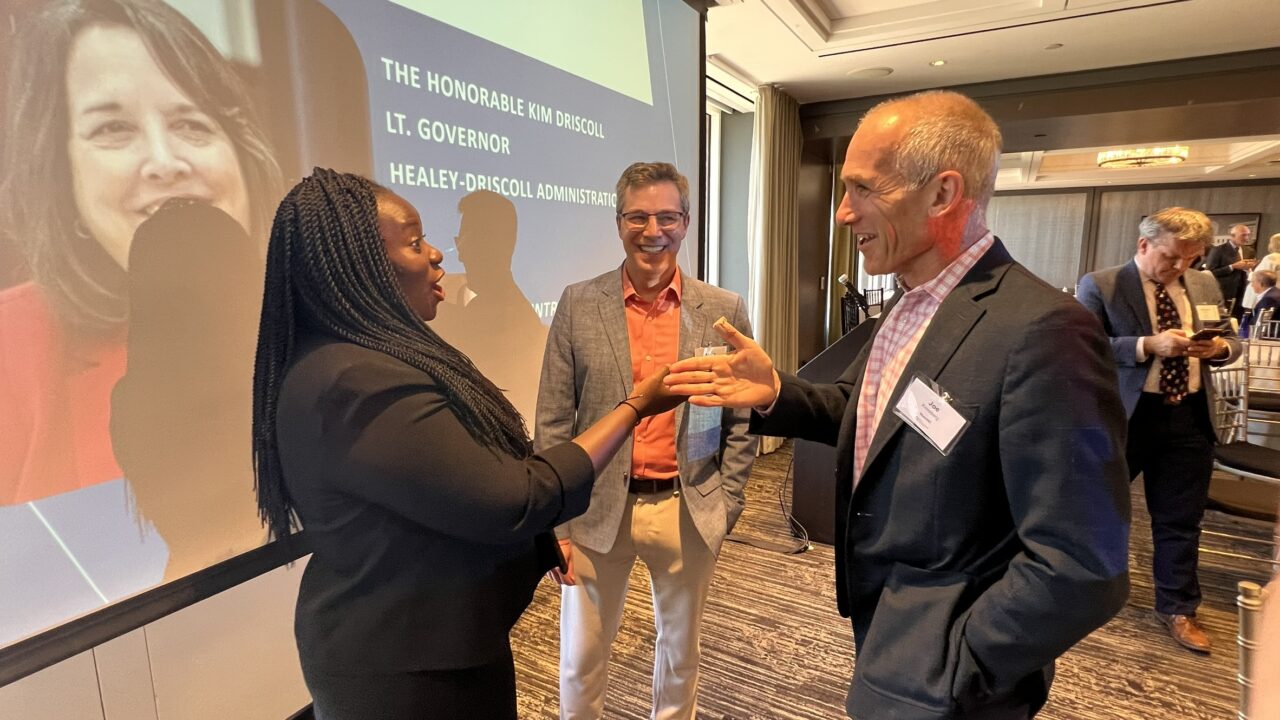
Panel I: Energy + Permitting—Clearing the Path to Growth
The first panel brought together Secretary Ed Augustus (EOHLC), Acting Secretary Ashley Stolba (EOED), and Melissa Lavinson, Executive Director of the Office of Energy Transformation(EEA) for a frank conversation about what’s stalling development—and how to fix it.
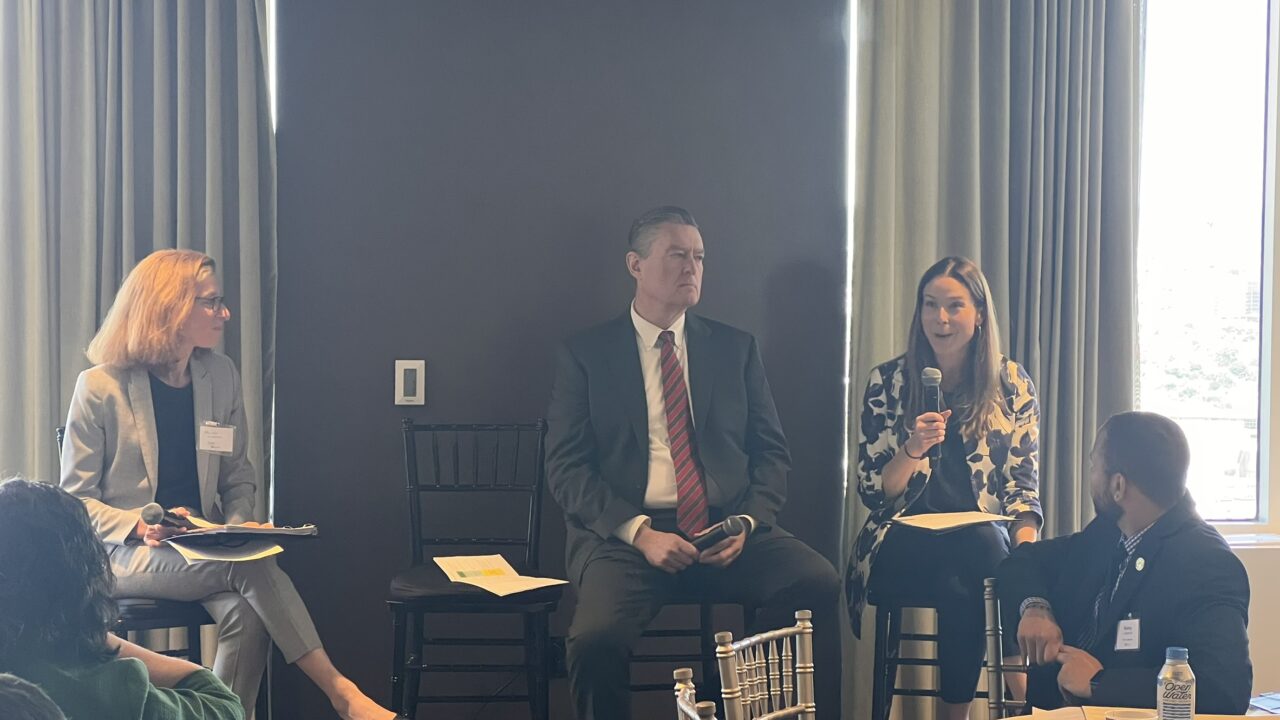
The state’s new “Business Front Door” portal was announced, a move aimed at demystifying how small businesses can access public incentives and make them more transparent. The panelists also acknowledged what many leaders in the room have felt for years: the lack of site-ready parcels, energy constraints, and utility red tape are slowing otherwise viable projects.

A big theme was energy abundance—not just clean, but affordable and accessible. Lavinson introduced the idea of “Energy Ready Zones” as a solution to pre-certify areas for development with the right infrastructure, while Stolba talked about how the state is exploring creative ways to make downtown revitalization efforts more capital-eligible.
Policy Center Updates: The Road Ahead
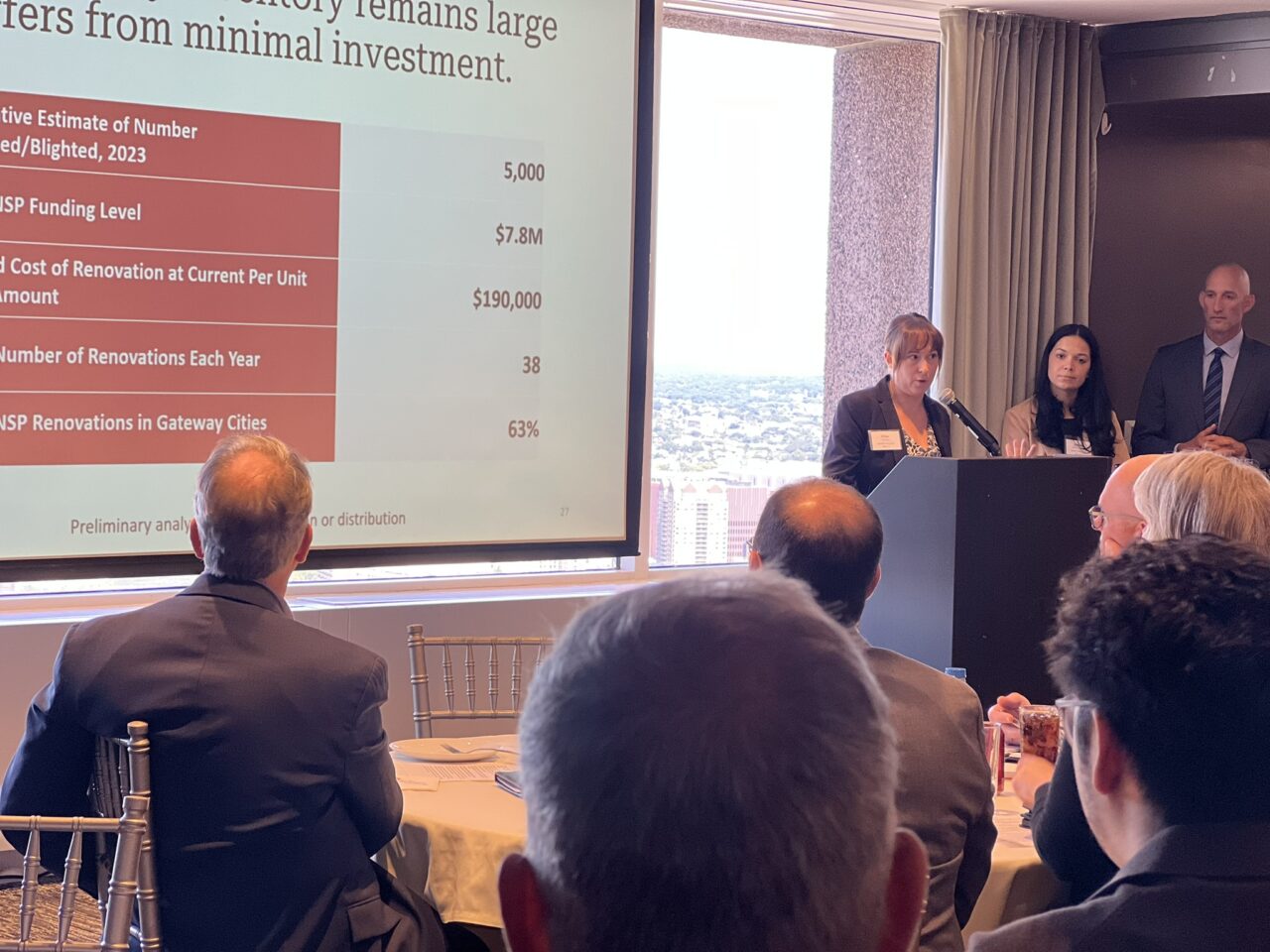
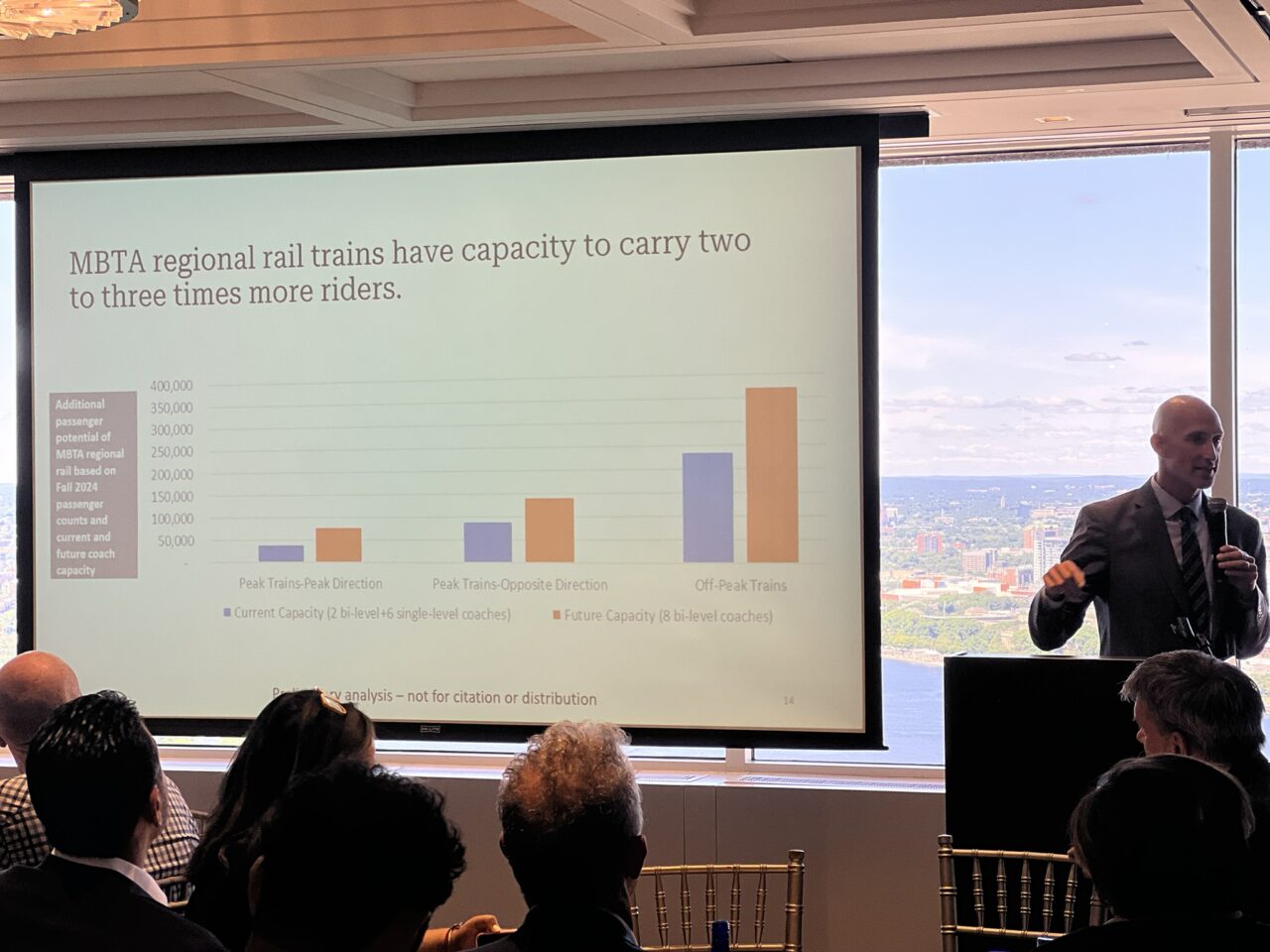
The MassINC Policy Center shared preliminary data from upcoming research across transportation, education, and housing. The stories behind the data painted a picture of uneven progress and persistent barriers.
- Transit: The state’s commuter rail system can already move 2–3 times more riders than it currently does. What’s needed isn’t necessarily more trains—but smarter pricing, targeted incentives, and intentional support for ridership during off-peak hours and reverse commutes.
- Education: Gateway City students are disproportionately learning in aging, overcrowded schools. The state’s school building authority policies put higher cost burdens on urban districts—leaving communities with the greatest needs on the outside looking in. Massachusetts must overhaul of how school facilities with the greatest needs are prioritized and funded.
- Housing: Permitting of new multifamily housing units has doubled in recent years, but this coincided with a unique, one-time increase in funding driven largely by ARPA and the Housing Development Incentive Program (HDIP). Meanwhile, Gateway Cities continue to be hamstrung by outdated and burdensome regulations and a sluggish rehab pipeline. One stat hit hard: at current funding levels for the Neighborhood Stabilization Program (NSP), it would take more than 100 years to rehab the existing stock of blighted vacant properties.
Full reports on transportation, education, and housing will be released this fall, offering deeper analysis and actionable recommendations to support Gateway Cities. Stay tuned for data-driven insights that will inform the next chapter of policy and investment across Massachusetts. Read recent reports from the MassINC Policy Center here.
Speaker Mariano Speaks on Economic Resilience
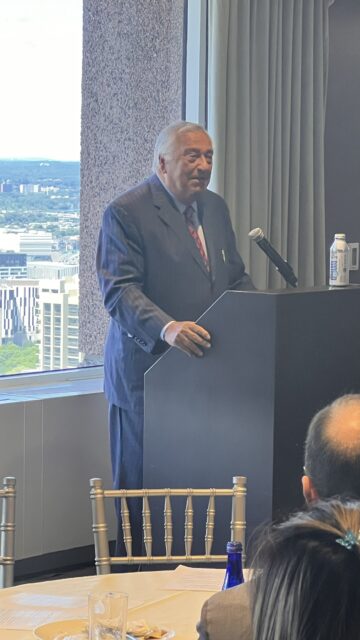
House Speaker Ron Mariano delivered a candid assessment of the challenges ahead. He expressed concern over hospital closures, flagged federal threats to clean energy investment, and emphasized the need to proactively address the water, climate, and infrastructure issues impacting many Gateway Cities.
Yet his remarks also struck a hopeful tone—grounded in tangible progress. He highlighted a strategic investment to extend water service from Quincy to Weymouth, enabling the development of 6,000 new housing units and prompting unprecedented collaboration across three municipalities.
His message was clear: Gateway Cities have the power to drive transformative change when they organize, build strong coalitions, and align with the legislature.
Panel II: Building an Economic Development Package that Delivers

The final session featured Senators Barry Finegold and John Cronin in conversation with MassINC’s André Leroux. The framing? Massachusetts is falling behind. States like North Carolina are gaining ground in employment, higher education, and affordability. The Commonwealth needs to adapt—fast.
The senators championed:
- Permitting reform as a top priority—accompanied by real accountability,
- Expanded vocational training, including new annexes for Gateway City high schools,
- A larger, more flexible HDIP, designed for mixed-income development that anchors families, not just singles or investors.
They also emphasized the importance of small business support, especially from local banks and credit unions who understand community needs better than state agencies. Senator Cronin summed it up well: “We can’t plan our way out of this. We have to build. And the places best positioned to do that are right here.”

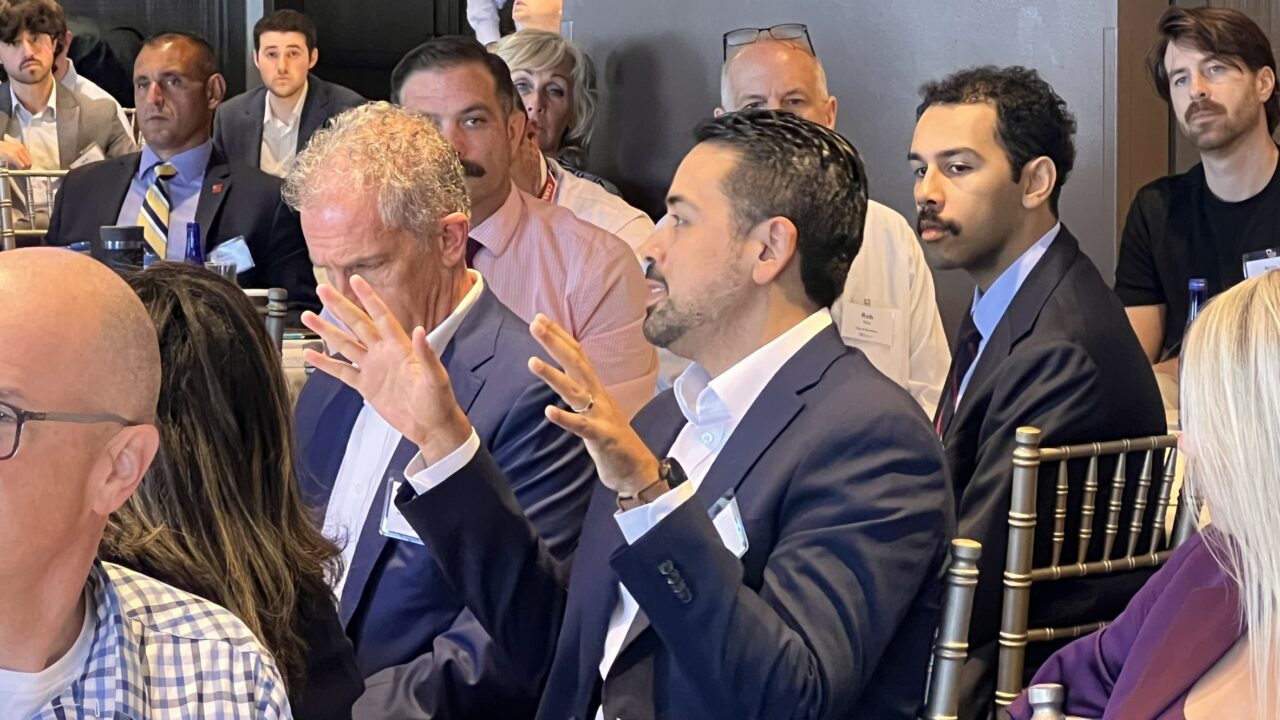
Looking Ahead: From Promise to Policy
The 2025 Gateway Cities Leadership Summit served as both a showcase of bold policy ideas and a powerful affirmation of the momentum building in local leadership. Whether advancing climate tech, transforming schools into community hubs, or accelerating housing production, Gateway Cities are where innovation and implementation converge.

Save the Date: The conversation continues at the Gateway Cities Innovation Summit on October 28, 2025, in Lowell. We’ll dig deeper into what’s working—and what still needs to change.
Speakers
In order of appearance. Click to read bios.
Lt. Governor Kim Driscoll
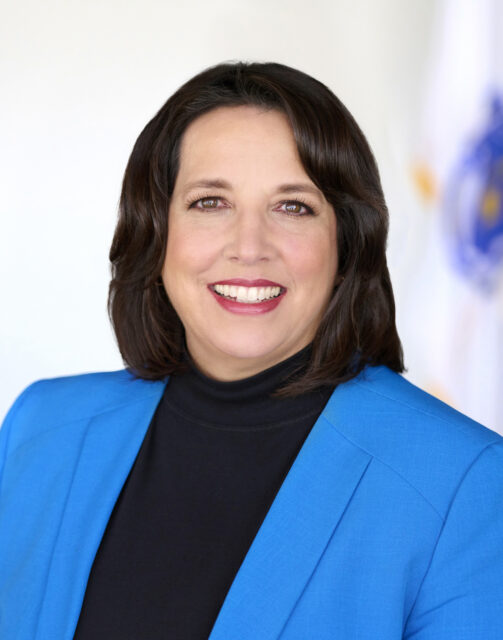
Kim Driscoll is the 73rd Lieutenant Governor of the Commonwealth of Massachusetts. She was sworn in on January 5, 2023, joining Governor Maura Healey in an historic series of firsts: Governor Healey is the first woman and first openly LGBTQ person elected Governor of Massachusetts, and together, Healey and Driscoll are the first all-women executive team to lead Massachusetts.
Since taking office, Lieutenant Governor Driscoll has spearheaded several administration priorities and initiatives. Exemplified by her extensive and successful career in local government, Driscoll has served has a notable proponent for the economic development of Massachusetts cities and towns, and serves as a liaison for municipalities across the state. This commitment also includes leadership on tackling the state’s housing crisis and improving the state’s public education policy. Driscoll also chairs the Governor’s Council, the Governor’s Council to Address Sexual Assault, Domestic Violence, and Human Trafficking, the Seaport Economic Council, and co-chairs the STEM Advisory Council.
Prior to taking office as Lieutenant Governor, Driscoll served as the City of Salems’s first woman Mayor. Elected in 2005, she turned deficits into record surpluses and saved taxpayers’ money by strengthening city services, revitalizing Salem’s downtown, leading a vast improvement in Salem’s k-12 schools, reforming city pensions and health insurance programs to protect employee benefits, bidding public contracts, and bringing transparency to City Hall. Under her leadership, Salem became one of the first communities in Massachusetts to adopt the expansion of free, high-quality early education opportunities starting at age four. Read full bio here.
Secretary Ed Augustus, Executive Office of Housing and Livable Communities
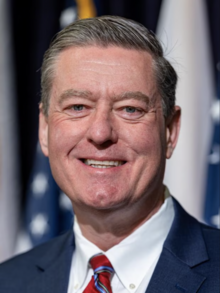
Edward Augustus is the Secretary of Housing and Livable Communities. Augustus served as City Manager of Worcester, functioning as the Chief Administrative and Executive Officer of the Gateway City of more than 200,000 people, from 2014-2022.
During his tenure, he oversaw the commitment or distribution of $25.3 million in Community Development Block Group, HOME Investment Partnerships Program, and Worcester Lead Abatement and Healthy Homes Program funds to develop or preserve more than 2,000 affordable housing units throughout the City. Augustus also dedicated $30 million of the ARPA funds coming into the city to housing, including $15 million for the Affordable Housing Trust Fund.
As City Manager, Augustus managed a $750 million budget, as well as the $90 million, 20-year Urban Revitalization Plan. Notably, he spearheaded the $240 million landmark redevelopment of Worcester’s Canal District. Prior to joining the City of Worcester, Augustus served as Director of Government & Community Relations for the College of Holy Cross, State Senator for the 2nd Worcester District, Chief of Staff for Congressman Jim McGovern, and Chief of Staff to the Assistant Secretary for Intergovernmental and Interagency Affairs at the U.S. Department of Education under President Clinton’s Administration. He most recently served as Chancellor of Dean College.
Interim Secretary Ashley Stolba, Executive Office of Economic Developmenet

Ashley Stolba is the Interim Secretary of the Executive Office of Economic Development (EOHED). She previously served as Undersecretary of Community Development and Undersecretary of Economic Foundations at EOHED, where she led initiatives to expand economic opportunity for residents, communities, and businesses across Massachusetts. In those roles, she managed the Community One Stop for Growth, served as vice-chair of the Seaport Economic Council, oversaw efforts to close the digital divide, and maintained oversight of the state’s military installations.
Stolba’s portfolio also included supporting regional businesses through the Massachusetts Office of Business Development, advancing small, micro, and immigrant-led enterprises, and launching the Director of Rural Affairs role. She served as the secretariat’s first climate officer, focusing on infrastructure needs tied to climate resilience, and worked closely with partners across the Healey-Driscoll Administration, MassDevelopment, and the Massachusetts Growth Capital Corporation.
Before joining EOHED, Stolba was Chief of Staff at the Harvard Allston Land Company. She also held positions as Deputy Chief of Staff and Legal Counsel at Massport, Associate Counsel at the Massachusetts Association of Realtors, and Policy Analyst in the Massachusetts House of Representatives. A Mashpee native, she holds a bachelor’s degree in business administration from the University of Miami and a J.D. from Suffolk University Law School.
Melissa Lavinson, Executive Director, Office of Energy Transformation, Executive Office of Energy and Environmental Affairs

Melissa Lavinson is the Executive Director of the Office of Energy Transformation at the Executive Office of Energy and Environmental Affairs (EEA). She brings extensive experience from the utility sector, most recently serving as Head of Corporate Affairs for National Grid New England. In that role, she led state and municipal government relations, stakeholder engagement, media relations, strategic communications, and equity and philanthropic initiatives, including Equity in Energy and Grid for Good.
Prior to National Grid, Lavinson was Senior Vice President of Federal Government and Regulatory Affairs and Public Policy at Exelon Corporation, and previously held a similar role at Pepco Holdings, Inc., overseeing governmental and external affairs for utilities across the Mid-Atlantic region. She spent over two decades at PG&E Corporation, where her roles included Vice President of Federal Affairs and Policy and Chief Sustainability Officer. Earlier in her career, she worked in energy and climate policy at MRW and Associates and ICF Consulting.
Lavinson holds a bachelor’s degree in Economics from Hamilton College.
Representative Ronald Mariano, Speaker of the MA House of Representatives
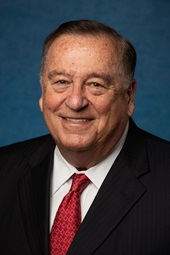
Representative Ronald J. Mariano (D-Quincy) has represented Quincy, Weymouth, and Holbrook in the Massachusetts House of Representatives since 1991. He was elected Speaker in December of 2020 during the COVID-19 pandemic, and oversaw the disbursement of American Rescue Plan Act (ARPA) funds, delivering targeted support to workers, businesses, and to critical sectors of the economy. Speaker Mariano’s top priority is making Massachusetts an affordable place to live and raise a family, and he remains focused on continuing to sustain the state’s progress in health care, education, and innovation. As Speaker, he also led the House in reauthorizing the third iteration of the Life Sciences Initiative, cementing Massachusetts’ role as a leader in the biotechnology industry.
Throughout his career, Speaker Mariano has been a driving force behind groundbreaking legislation related to health care, gun control, and clean energy. Speaker Mariano was a key architect of the Commonwealth’s landmark health care reform law of 2006, which went on to serve as a model for the Affordable Care Act. Additionally, prior to his Speakership, Speaker Mariano led many of the House’s conference committee negotiations for bills that established school accountability standards, contained health care cost growth, reformed the criminal justice system, created an adult-use marijuana industry, and that regulated ride-sharing services. Speaker Mariano was the lead negotiator during Massachusetts’ 2014 gun safety reform effort and the subsequent ban on bump stocks, which have made Massachusetts a national leader in gun safety. Speaker Mariano, throughout his career, has been an ardent proponent of LGBTQ+ rights, civil rights, and of ensuring access to reproductive justice and to women’s health care.
Speaker Mariano is a lifelong resident of Quincy Point and is married to Eve Powell, a retired Quincy Public Schools teacher. He attended Quincy Public Schools, and holds a bachelor’s degree from Northeastern University and a master’s degree from the University of Massachusetts Boston. He taught in the Quincy Public Schools for 12 years and served as a member of the Quincy School Committee for 18 years. He is a lifelong basketball fan and coached Quincy Youth Basketball for many years.
Senator Barry Finegold, Senate Economic Development Chair

Senator Barry Finegold is a Democratic member of the Massachusetts Senate, representing the Second Essex and Middlesex District. He serves as Chair of the Joint Committee on Economic Development and Emerging Technologies, leading the Senate’s efforts to foster innovation, job creation, and inclusive growth across the Commonwealth. He previously held this Senate seat from 2011 to 2015 and served in the Massachusetts House of Representatives from 1997 to 2011.
Over his legislative career, Finegold has championed landmark reforms, including the 2014 election modernization law that introduced early voting, online registration, and post-election audits to Massachusetts. He has also been a strong advocate for clean energy, renewable technology, and infrastructure investment.
Outside the legislature, Finegold is a founding partner of Dalton & Finegold, LLP, a law firm focused on real estate, estate planning, and corporate law. He lives in Andover with his wife, Amy, and their three children, Ava, Ella, and Max.
Finegold earned a bachelor’s degree in government from Franklin & Marshall College, a J.D. from Massachusetts School of Law, and a master’s in public administration from Harvard University’s Kennedy School of Government.
Senator John Cronin, Co-Chair, Gateway Cities Caucus
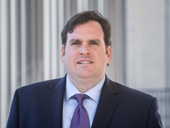
Senator John J. Cronin was elected to the Senate in 2020 and represents the communities of Ashby, Clinton, Fitchburg, Groton, Lancaster, Leominster, Lunenburg, Shirley, Townsend, and Westford.
Prior to election to the Massachusetts Senate, Cronin served as an Infantry Officer and is a combat veteran of the war in Afghanistan. He was honorably discharged from the U.S. Army as a Captain in 2018 and worked as a veterans advocate at a legal services center in Boston. John currently serves as the Senate Chair of the Gateway Cities Caucus, Chair of the Joint Committee on Consumer Protection and Professional Licensure, and as Vice Chair of the Joint Committee on Healthcare Financing. Senator Cronin’s legislative agenda aims to revitalize Gateway Cities, spur housing production, and build a broader middle class through workforce development pathways. Senator Cronin resides in Fitchburg.
